Unit5 Good manners Period2 Reading课件(28张PPT)
文档属性
| 名称 | Unit5 Good manners Period2 Reading课件(28张PPT) | 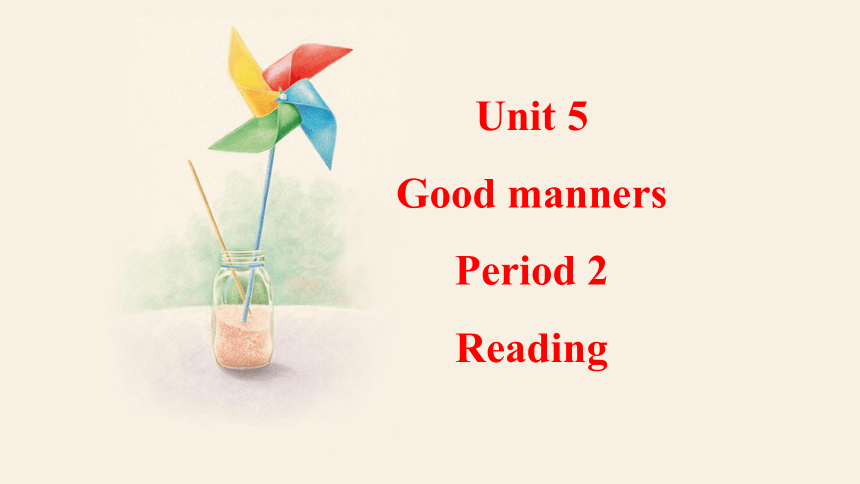 | |
| 格式 | pptx | ||
| 文件大小 | 107.5MB | ||
| 资源类型 | 教案 | ||
| 版本资源 | 牛津译林版 | ||
| 科目 | 英语 | ||
| 更新时间 | 2023-12-29 10:54:15 | ||
图片预览

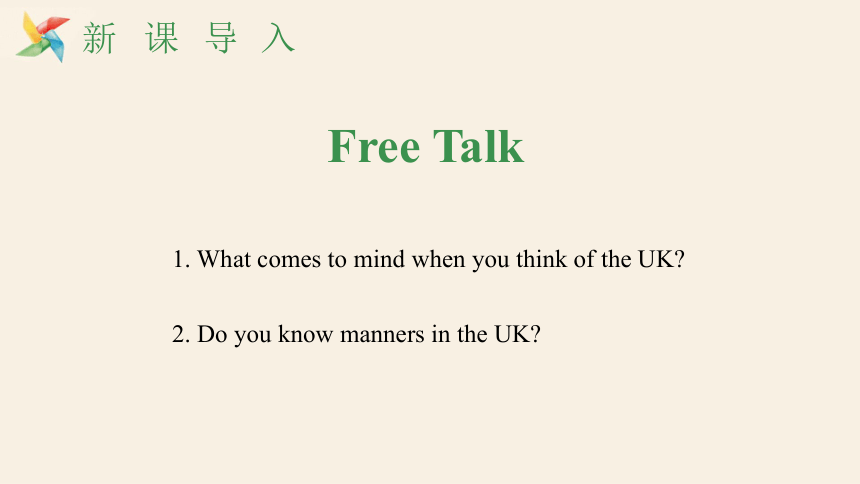
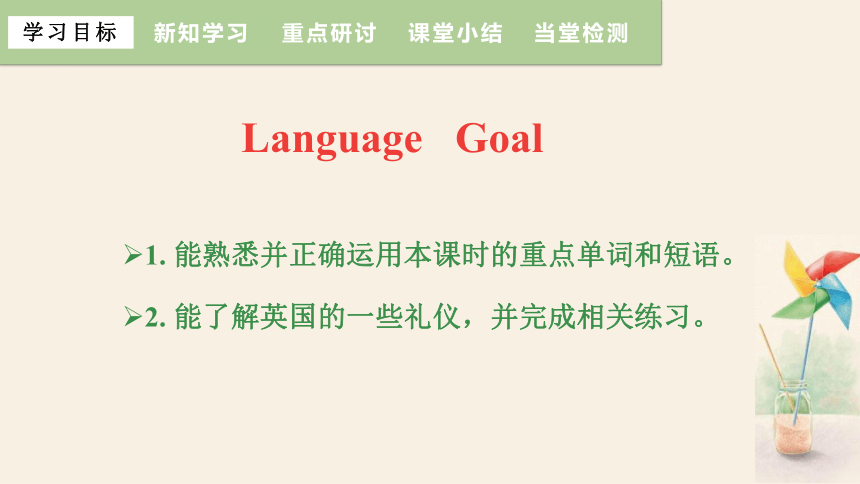
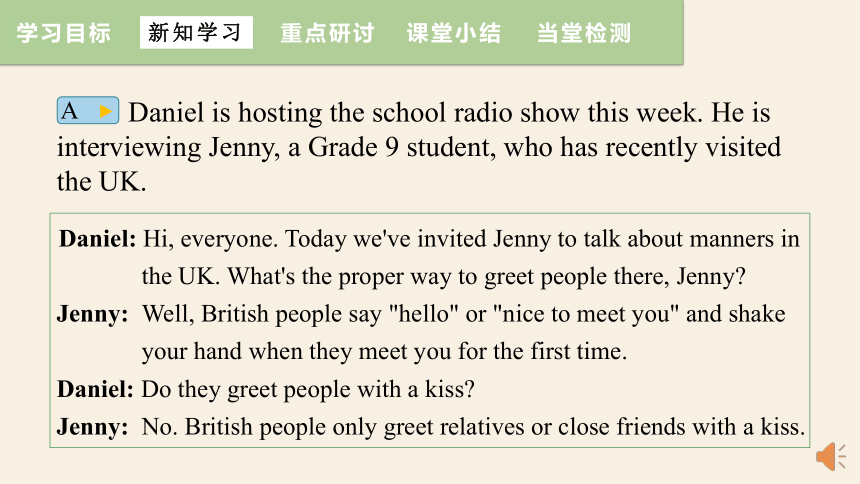
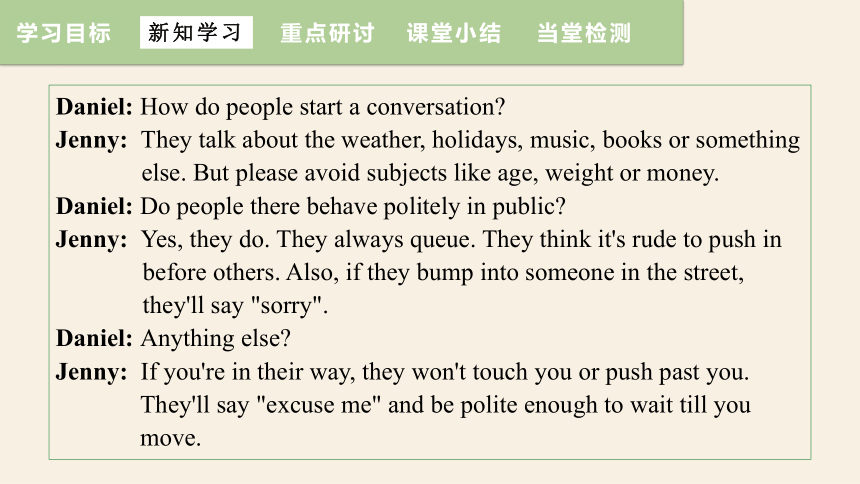
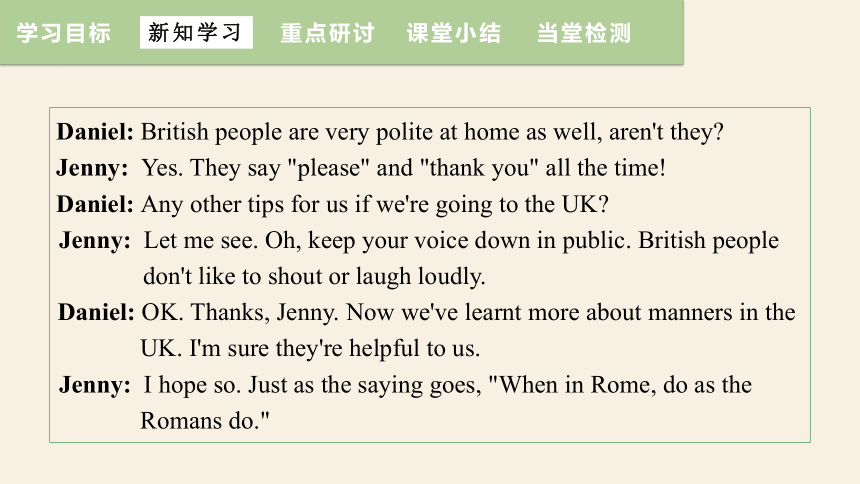
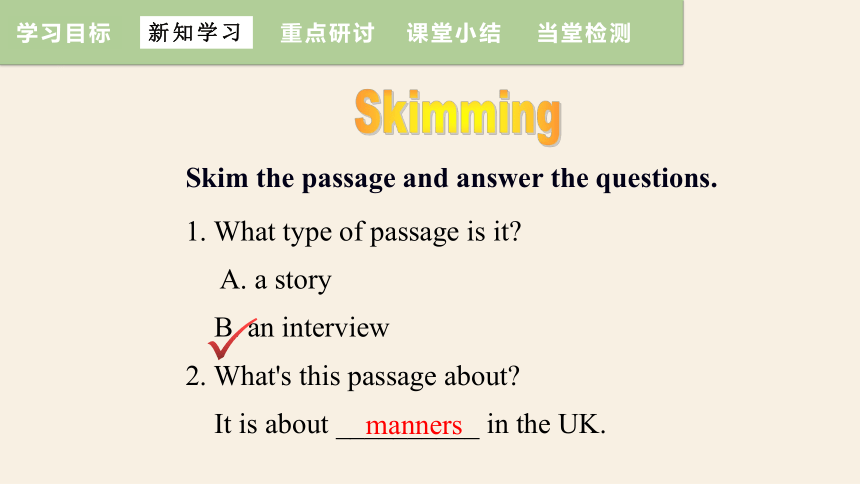
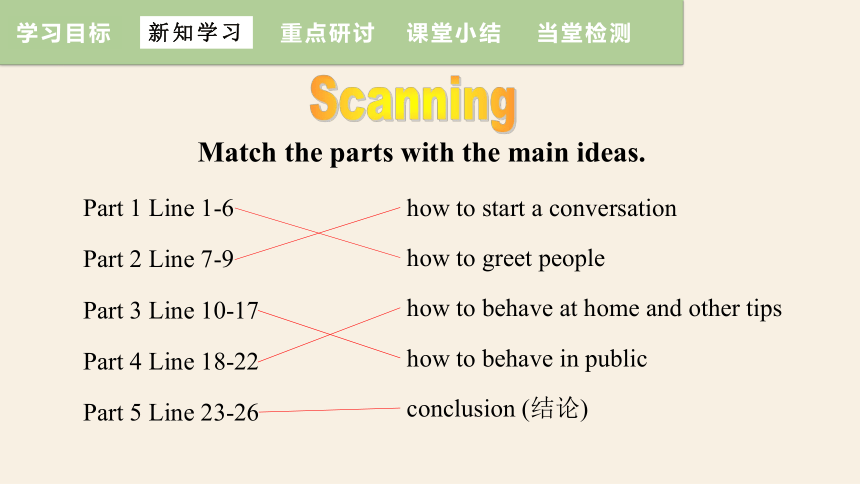

文档简介
(共28张PPT)
Unit 5
Good manners
Period 2
Reading
新
课
导
入
Free Talk
1. What comes to mind when you think of the UK
2. Do you know manners in the UK
Language Goal
新知学习
课堂小结
当堂检测
学习目标
重点研讨
1. 能熟悉并正确运用本课时的重点单词和短语。
2. 能了解英国的一些礼仪,并完成相关练习。
新知学习
课堂小结
当堂检测
学习目标
重点研讨
Daniel is hosting the school radio show this week. He is interviewing Jenny, a Grade 9 student, who has recently visited the UK.
A
▲
Daniel: Hi, everyone. Today we've invited Jenny to talk about manners in the UK. What's the proper way to greet people there, Jenny
Jenny: Well, British people say "hello" or "nice to meet you" and shake your hand when they meet you for the first time.
Daniel: Do they greet people with a kiss
Jenny: No. British people only greet relatives or close friends with a kiss.
新知学习
课堂小结
当堂检测
学习目标
重点研讨
Daniel: How do people start a conversation
Jenny: They talk about the weather, holidays, music, books or something else. But please avoid subjects like age, weight or money.
Daniel: Do people there behave politely in public
Jenny: Yes, they do. They always queue. They think it's rude to push in before others. Also, if they bump into someone in the street, they'll say "sorry".
Daniel: Anything else
Jenny: If you're in their way, they won't touch you or push past you. They'll say "excuse me" and be polite enough to wait till you move.
新知学习
课堂小结
当堂检测
学习目标
重点研讨
Daniel: British people are very polite at home as well, aren't they
Jenny: Yes. They say "please" and "thank you" all the time!
Daniel: Any other tips for us if we're going to the UK
Jenny: Let me see. Oh, keep your voice down in public. British people don't like to shout or laugh loudly.
Daniel: OK. Thanks, Jenny. Now we've learnt more about manners in the UK. I'm sure they're helpful to us.
Jenny: I hope so. Just as the saying goes, "When in Rome, do as the Romans do."
新知学习
课堂小结
当堂检测
学习目标
重点研讨
Skim the passage and answer the questions.
Skimming
1. What type of passage is it
A. a story
B. an interview
2. What's this passage about
It is about __________ in the UK.
manners
新知学习
课堂小结
当堂检测
学习目标
重点研讨
Match the parts with the main ideas.
Scanning
Part 1 Line 1-6
Part 2 Line 7-9
Part 3 Line 10-17
Part 4 Line 18-22
how to start a conversation
how to greet people
how to behave in public
how to behave at home and other tips
Part 5 Line 23-26
conclusion (结论)
新知学习
课堂小结
当堂检测
学习目标
重点研讨
Read Part 1 and answer the questions.
Detailed reading
1. What is the proper way to greet people in the UK
2. Who do they greet with a kiss
British people say “hello” or “nice to meet you” and shake your hand when they meet you for the first time.
They only greet relatives or close friends with a kiss.
新知学习
课堂小结
当堂检测
学习目标
重点研讨
Read Part 2 fill in the blanks.
talk about
______________
_______________________
______________
______________
______________
______________
______________
_______________
weather
holidays
music
books
something else
age
weight
money
avoid
subjects
新知学习
课堂小结
当堂检测
学习目标
重点研讨
Read Part 3 and Part 4 and fill in the table.
do don't
In public always ________ _______ before others
say if bumping into someone
say if someone is in their way or past
keep ______________ or loudly
At home say _________________ all the time
queue
push in
sorry
excuse me
touch
push
the voice down
shout
laugh
please or thank you
新知学习
课堂小结
当堂检测
学习目标
重点研讨
Read Part 5 and answer the question.
What does the sentence “When in Rome, do as the Romans do.” mean
入乡随俗
1 proper
2 greet
3 conversation
4 avoid
5 push in
6 bump
新知学习
课堂小结
当堂检测
学习目标
重点研讨
Simon does not know some of the words in the interview. Help him match the words on the left with the meanings on the right. Write the correct letters in the blanks.
B1
▲
_____
_____
_____
_____
_____
_____
c
d
a
f
b
e
a a small talk
b try not to do something
c go in front of other
people who are waiting
d hit someone or something
by accident
e right or correct
f say hello to someone or
welcome them
新知学习
课堂小结
当堂检测
学习目标
重点研讨
Simon is trying to make sure that he remembers what Jenny talked about on the radio. Help him tick for what British people do and for what they do not do.
B2
▲
新知学习
课堂小结
当堂检测
学习目标
重点研讨
say “hello” or “nice to meet you”
shake hands
usually greet people with a kiss
talk about the weather, holidays, music or books
talk about age, weight or money
queue for something
push in before others
say “sorry” if they bump into others
push past people
shout or laugh loudly
say “please” and “thank you” all the time
Greeting:
In public:
At home:
√
√
√
√
√
√
√
√
√
√
√
新知学习
课堂小结
当堂检测
学习目标
重点研讨
Jenny is writing an article about good manners in the UK for the school newsletter. Help her complete her article with the correct words.
B3
▲
Good manners in the UK
British people usually say “hello” or “nice to meet you” and (1) _______________ when they meet you for the first time. They only greet (2) ________ or close friends with a kiss. They like to start a (3) ___________ with subjects like the weather, holidays, music or books. They (4) _____ talking about age, weight or money.
shake your hand
relatives
conversation
avoid
新知学习
课堂小结
当堂检测
学习目标
重点研讨
British people think it is rude to (5) _________ before others. They always (6) ______. They say “sorry” if they (7) __________ you in the street. When they want you to (8) ______, they say “excuse me”. They do not like to shout or laugh loudly (9) _________. British people are (10) __________ at home too. They say “please” or “thank you” (11) ___________.
“When in Rome, do as (12) ___________ do.” When we are in a strange place, we should do as the local people do.
push in
queue
bump into
move
in public
very polite
all the time
the Romans
新知学习
课堂小结
当堂检测
学习目标
重点研讨
Daniel is thinking about the differences in manners between the UK and China. Work in pairs and discuss his questions below with your partner.
C
▲
1 How do we greet each other
2 How do we usually start a conversation
3 Do we always queue
4 What do we do if someone is in our way
5 Do we shout or laugh loudly in public
6 Do we say “please” and “thank you” at home
7 Do we need to improve our manners
Language Points
新知学习
课堂小结
当堂检测
学习目标
重点研讨
1. Well, British people say “hello” or “nice to meet you” and shake your hand when they meet you for the first time.
喔,当英国人第一次见到你时,他们说“你好”或“见到你很高兴”并且与你握手。
shake sb.'s hand 与某人握手=shake hands with sb.
e.g. He came up to me and shook my hand.
=He came up to me and shook hands with me.
他走到我面前和我握手。
新知学习
课堂小结
当堂检测
学习目标
重点研讨
2. Do they greet people with a kiss
他们用亲吻这种方式打招呼吗?
greet somebody with ... 以……方式跟人打招呼
e.g. She greeted us with a smile.
她微笑着跟我们打了个招呼。
新知学习
课堂小结
当堂检测
学习目标
重点研讨
3. But please avoid subjects like age, weight or money.
但是请避开像年龄、体重或金钱这样的话题。
avoid vt. 避免,后常跟名词、动词-ing形式,构成avoid doing sth.结构,意为“避免做某事”。
e.g. You should avoid eating unhealthy food.
你应该避免吃不健康的食物。
4. Do people there behave politely in public
那儿的人们在公共场合表现得礼貌吗?
in public 公开地,在别人面前
e.g. She doesn't know how to behave in public.
她不知道在公众场合该怎么表现。
新知学习
课堂小结
当堂检测
学习目标
重点研讨
5. They think it's rude to push in before others.
他们认为在别人面前插队是粗鲁无礼的。
It is + adj. + to do sth. 做某事是……的
e.g. It is impolite to ask British people how old they are.
问英国人多大年纪是不礼貌的。
e.g. Don't push in, wait in line like everyone else.
不要插队,像别人一样排队等候。
push in 插队,加塞 = cut in
新知学习
课堂小结
当堂检测
学习目标
重点研讨
6. Also, if they bump into someone in the street, they'll say "sorry".
另外,如果他们在街上撞到别人,他们会说“对不起”。
bump into sb. 撞到某人;偶然遇见
e.g. I'm so sorry to bump into you.
对不起,我撞到你了。
e.g. I couldn't walk very fast because a lot of people got in my way.
我不能走的很快,因为很多人挡了我的路。
7. If you're in their way, they won't touch you or push past you.
如果你挡了他们的路,他们不会碰你或推开你。
in one's way 挡住某人的路
新知学习
课堂小结
当堂检测
学习目标
重点研讨
8. They'll say "excuse me" and be polite enough to wait till you move. 他们会说“劳驾”,礼貌地等你走。
excuse me 劳驾
e.g. Excuse me. Can you tell me how to go to the park
劳驾,你能告诉我如何去公园吗?
9. British people are very polite at home as well, aren't they
as well (as) 也,还有
e.g. I write my own songs and I play the guitar as well.
我自己写歌,也弹吉他。
新知学习
课堂小结
当堂检测
学习目标
重点研讨
11. hit someone or something by accident
意外地撞到某人或某物
by accident 偶然,意外地
e.g. The other day I met her by accident.
前几天我偶然遇到了她。
10. Just as the saying goes, "When in Rome, do as the Romans do."
正如俗话所说,“入乡随俗”。
When in Rome, do as the Romans do. 入乡随俗。这是一句英国习语,其省略形式when in Rome也可以表达同样的意思。
新知学习
重点研讨
课堂小结
当堂检测
学习目标
Unit 5
Period 2
重点单词及短语:
proper, greet, kiss, close, conversation, avoid, subject, behave, public, push, bump, touch, excuse, till, loudly, as, saying, Roman, shake sb.'s hand, in public, push in, in one's way, excuse me, as well (as), by accident
英国礼仪:
1. 英国人如何和人打招呼?初次见面时他们通常说_____或者______________以及和他们握手。
2. 如何开始一段谈话?避免谈论_____、_______或_________等。
hello
nice to meet you
年龄
体重
金钱
1. Don't ______ (触摸) anything on show in the museum.
2. Little Cindy gave her mother a _______ (吻).
3. When something worries me, I always talk to my ________
(亲密的) friend.
4. The young man _______ (推) back his chair and stood up.
5. I had a face-to-face c_____________ (谈话) with my students
that day.
新知学习
课堂小结
当堂检测
学习目标
重点研讨
一、根据句意及提示完成下列句子。
touch
kiss
pushed
close
onversation
新知学习
课堂小结
当堂检测
学习目标
重点研讨
二、用所给单词的适当形式填空。
1. My friend invited me_______ (have) dinner with her.
2. The guests all laugh _______(loud).
3. They all avoid _______ (talk) about that subject.
4. It's impolite to ask someone's ________ (weigh).
5. It's useful _______ (learn) some manners in our life.
to have
loudly
talking
weight
to learn
Unit 5
Good manners
Period 2
Reading
新
课
导
入
Free Talk
1. What comes to mind when you think of the UK
2. Do you know manners in the UK
Language Goal
新知学习
课堂小结
当堂检测
学习目标
重点研讨
1. 能熟悉并正确运用本课时的重点单词和短语。
2. 能了解英国的一些礼仪,并完成相关练习。
新知学习
课堂小结
当堂检测
学习目标
重点研讨
Daniel is hosting the school radio show this week. He is interviewing Jenny, a Grade 9 student, who has recently visited the UK.
A
▲
Daniel: Hi, everyone. Today we've invited Jenny to talk about manners in the UK. What's the proper way to greet people there, Jenny
Jenny: Well, British people say "hello" or "nice to meet you" and shake your hand when they meet you for the first time.
Daniel: Do they greet people with a kiss
Jenny: No. British people only greet relatives or close friends with a kiss.
新知学习
课堂小结
当堂检测
学习目标
重点研讨
Daniel: How do people start a conversation
Jenny: They talk about the weather, holidays, music, books or something else. But please avoid subjects like age, weight or money.
Daniel: Do people there behave politely in public
Jenny: Yes, they do. They always queue. They think it's rude to push in before others. Also, if they bump into someone in the street, they'll say "sorry".
Daniel: Anything else
Jenny: If you're in their way, they won't touch you or push past you. They'll say "excuse me" and be polite enough to wait till you move.
新知学习
课堂小结
当堂检测
学习目标
重点研讨
Daniel: British people are very polite at home as well, aren't they
Jenny: Yes. They say "please" and "thank you" all the time!
Daniel: Any other tips for us if we're going to the UK
Jenny: Let me see. Oh, keep your voice down in public. British people don't like to shout or laugh loudly.
Daniel: OK. Thanks, Jenny. Now we've learnt more about manners in the UK. I'm sure they're helpful to us.
Jenny: I hope so. Just as the saying goes, "When in Rome, do as the Romans do."
新知学习
课堂小结
当堂检测
学习目标
重点研讨
Skim the passage and answer the questions.
Skimming
1. What type of passage is it
A. a story
B. an interview
2. What's this passage about
It is about __________ in the UK.
manners
新知学习
课堂小结
当堂检测
学习目标
重点研讨
Match the parts with the main ideas.
Scanning
Part 1 Line 1-6
Part 2 Line 7-9
Part 3 Line 10-17
Part 4 Line 18-22
how to start a conversation
how to greet people
how to behave in public
how to behave at home and other tips
Part 5 Line 23-26
conclusion (结论)
新知学习
课堂小结
当堂检测
学习目标
重点研讨
Read Part 1 and answer the questions.
Detailed reading
1. What is the proper way to greet people in the UK
2. Who do they greet with a kiss
British people say “hello” or “nice to meet you” and shake your hand when they meet you for the first time.
They only greet relatives or close friends with a kiss.
新知学习
课堂小结
当堂检测
学习目标
重点研讨
Read Part 2 fill in the blanks.
talk about
______________
_______________________
______________
______________
______________
______________
______________
_______________
weather
holidays
music
books
something else
age
weight
money
avoid
subjects
新知学习
课堂小结
当堂检测
学习目标
重点研讨
Read Part 3 and Part 4 and fill in the table.
do don't
In public always ________ _______ before others
say if bumping into someone
say if someone is in their way or past
keep ______________ or loudly
At home say _________________ all the time
queue
push in
sorry
excuse me
touch
push
the voice down
shout
laugh
please or thank you
新知学习
课堂小结
当堂检测
学习目标
重点研讨
Read Part 5 and answer the question.
What does the sentence “When in Rome, do as the Romans do.” mean
入乡随俗
1 proper
2 greet
3 conversation
4 avoid
5 push in
6 bump
新知学习
课堂小结
当堂检测
学习目标
重点研讨
Simon does not know some of the words in the interview. Help him match the words on the left with the meanings on the right. Write the correct letters in the blanks.
B1
▲
_____
_____
_____
_____
_____
_____
c
d
a
f
b
e
a a small talk
b try not to do something
c go in front of other
people who are waiting
d hit someone or something
by accident
e right or correct
f say hello to someone or
welcome them
新知学习
课堂小结
当堂检测
学习目标
重点研讨
Simon is trying to make sure that he remembers what Jenny talked about on the radio. Help him tick for what British people do and for what they do not do.
B2
▲
新知学习
课堂小结
当堂检测
学习目标
重点研讨
say “hello” or “nice to meet you”
shake hands
usually greet people with a kiss
talk about the weather, holidays, music or books
talk about age, weight or money
queue for something
push in before others
say “sorry” if they bump into others
push past people
shout or laugh loudly
say “please” and “thank you” all the time
Greeting:
In public:
At home:
√
√
√
√
√
√
√
√
√
√
√
新知学习
课堂小结
当堂检测
学习目标
重点研讨
Jenny is writing an article about good manners in the UK for the school newsletter. Help her complete her article with the correct words.
B3
▲
Good manners in the UK
British people usually say “hello” or “nice to meet you” and (1) _______________ when they meet you for the first time. They only greet (2) ________ or close friends with a kiss. They like to start a (3) ___________ with subjects like the weather, holidays, music or books. They (4) _____ talking about age, weight or money.
shake your hand
relatives
conversation
avoid
新知学习
课堂小结
当堂检测
学习目标
重点研讨
British people think it is rude to (5) _________ before others. They always (6) ______. They say “sorry” if they (7) __________ you in the street. When they want you to (8) ______, they say “excuse me”. They do not like to shout or laugh loudly (9) _________. British people are (10) __________ at home too. They say “please” or “thank you” (11) ___________.
“When in Rome, do as (12) ___________ do.” When we are in a strange place, we should do as the local people do.
push in
queue
bump into
move
in public
very polite
all the time
the Romans
新知学习
课堂小结
当堂检测
学习目标
重点研讨
Daniel is thinking about the differences in manners between the UK and China. Work in pairs and discuss his questions below with your partner.
C
▲
1 How do we greet each other
2 How do we usually start a conversation
3 Do we always queue
4 What do we do if someone is in our way
5 Do we shout or laugh loudly in public
6 Do we say “please” and “thank you” at home
7 Do we need to improve our manners
Language Points
新知学习
课堂小结
当堂检测
学习目标
重点研讨
1. Well, British people say “hello” or “nice to meet you” and shake your hand when they meet you for the first time.
喔,当英国人第一次见到你时,他们说“你好”或“见到你很高兴”并且与你握手。
shake sb.'s hand 与某人握手=shake hands with sb.
e.g. He came up to me and shook my hand.
=He came up to me and shook hands with me.
他走到我面前和我握手。
新知学习
课堂小结
当堂检测
学习目标
重点研讨
2. Do they greet people with a kiss
他们用亲吻这种方式打招呼吗?
greet somebody with ... 以……方式跟人打招呼
e.g. She greeted us with a smile.
她微笑着跟我们打了个招呼。
新知学习
课堂小结
当堂检测
学习目标
重点研讨
3. But please avoid subjects like age, weight or money.
但是请避开像年龄、体重或金钱这样的话题。
avoid vt. 避免,后常跟名词、动词-ing形式,构成avoid doing sth.结构,意为“避免做某事”。
e.g. You should avoid eating unhealthy food.
你应该避免吃不健康的食物。
4. Do people there behave politely in public
那儿的人们在公共场合表现得礼貌吗?
in public 公开地,在别人面前
e.g. She doesn't know how to behave in public.
她不知道在公众场合该怎么表现。
新知学习
课堂小结
当堂检测
学习目标
重点研讨
5. They think it's rude to push in before others.
他们认为在别人面前插队是粗鲁无礼的。
It is + adj. + to do sth. 做某事是……的
e.g. It is impolite to ask British people how old they are.
问英国人多大年纪是不礼貌的。
e.g. Don't push in, wait in line like everyone else.
不要插队,像别人一样排队等候。
push in 插队,加塞 = cut in
新知学习
课堂小结
当堂检测
学习目标
重点研讨
6. Also, if they bump into someone in the street, they'll say "sorry".
另外,如果他们在街上撞到别人,他们会说“对不起”。
bump into sb. 撞到某人;偶然遇见
e.g. I'm so sorry to bump into you.
对不起,我撞到你了。
e.g. I couldn't walk very fast because a lot of people got in my way.
我不能走的很快,因为很多人挡了我的路。
7. If you're in their way, they won't touch you or push past you.
如果你挡了他们的路,他们不会碰你或推开你。
in one's way 挡住某人的路
新知学习
课堂小结
当堂检测
学习目标
重点研讨
8. They'll say "excuse me" and be polite enough to wait till you move. 他们会说“劳驾”,礼貌地等你走。
excuse me 劳驾
e.g. Excuse me. Can you tell me how to go to the park
劳驾,你能告诉我如何去公园吗?
9. British people are very polite at home as well, aren't they
as well (as) 也,还有
e.g. I write my own songs and I play the guitar as well.
我自己写歌,也弹吉他。
新知学习
课堂小结
当堂检测
学习目标
重点研讨
11. hit someone or something by accident
意外地撞到某人或某物
by accident 偶然,意外地
e.g. The other day I met her by accident.
前几天我偶然遇到了她。
10. Just as the saying goes, "When in Rome, do as the Romans do."
正如俗话所说,“入乡随俗”。
When in Rome, do as the Romans do. 入乡随俗。这是一句英国习语,其省略形式when in Rome也可以表达同样的意思。
新知学习
重点研讨
课堂小结
当堂检测
学习目标
Unit 5
Period 2
重点单词及短语:
proper, greet, kiss, close, conversation, avoid, subject, behave, public, push, bump, touch, excuse, till, loudly, as, saying, Roman, shake sb.'s hand, in public, push in, in one's way, excuse me, as well (as), by accident
英国礼仪:
1. 英国人如何和人打招呼?初次见面时他们通常说_____或者______________以及和他们握手。
2. 如何开始一段谈话?避免谈论_____、_______或_________等。
hello
nice to meet you
年龄
体重
金钱
1. Don't ______ (触摸) anything on show in the museum.
2. Little Cindy gave her mother a _______ (吻).
3. When something worries me, I always talk to my ________
(亲密的) friend.
4. The young man _______ (推) back his chair and stood up.
5. I had a face-to-face c_____________ (谈话) with my students
that day.
新知学习
课堂小结
当堂检测
学习目标
重点研讨
一、根据句意及提示完成下列句子。
touch
kiss
pushed
close
onversation
新知学习
课堂小结
当堂检测
学习目标
重点研讨
二、用所给单词的适当形式填空。
1. My friend invited me_______ (have) dinner with her.
2. The guests all laugh _______(loud).
3. They all avoid _______ (talk) about that subject.
4. It's impolite to ask someone's ________ (weigh).
5. It's useful _______ (learn) some manners in our life.
to have
loudly
talking
weight
to learn
